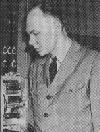Howard Hathaway Aiken

|
principal papers
hardware software keywords Mark I Related Subjects |
Achievement Invented the Mark I Biography Howard Hathaway Aiken was born March 8, 1900 in Hoboken,
New Jersey. However he grew up in Indianapolis, Indiana where he attended
the Arsenal Technical High School. After high school he studied at
the University of Wisconsin where he received a bachelor's degree
in electrical engineering. During college Aiken worked for the Madison
Gas Company; after graduation he was promoted to chief engineer there.
It took seven years and a lot of money to finally get
the machine operational. Part of the delay was due to the intervention
of World War II. Officially the computer was called the IBM Automatic
Sequence Controlled Calculator but most everyone called it the Mark
I. After completing the Mark I, Aiken went on to produce three more
computers, two of which were electric rather than electromechanical.
Chronology
Honors and awards |
![]()
| Last Updated on October 18, 2002 | For suggestions please mail the editors |
Footnotes & References
| 1 | text by Hallie Jones |
| 2 | |
| 3 |